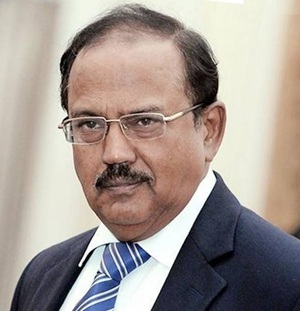Feb 11, 2026
Feb 11, 2026
Ajit Doval & The Rise of New India’s Defense Doctrine
 Who protects a billion lives without ever appearing in the limelight? Who walks into enemy territory alone, unarmed, and disguised, not once but repeatedly, for the sake of a sleeping nation? What kind of man rewires the strategic DNA of a country — not with speeches, but with execution?
Who protects a billion lives without ever appearing in the limelight? Who walks into enemy territory alone, unarmed, and disguised, not once but repeatedly, for the sake of a sleeping nation? What kind of man rewires the strategic DNA of a country — not with speeches, but with execution?
That man is Ajit Doval. India's most enigmatic spymaster, its first soldier in the shadows, and now, its national security spine.
From the Hills of Pauri to the Halls of Power
Born in 1945 in the quiet mountain district of Pauri Garhwal, Ajit Doval’s story didn’t begin with noise. It began with clarity, courage, and an uncompromising commitment to Bharat. As the son of an Army man, Doval’s childhood was steeped in discipline and nationalism. He cracked the UPSC in his first attempt and joined the Kerala cadre of the Indian Police Service — only to become a legend in intelligence.
His first test came during the 1971 Thalassery riots. While the administration hesitated, Doval, a young IPS officer, walked into the communal fire alone. He didn’t shoot. He listened. He resolved. And he restored peace. Delhi took note.
The Man Who Dared the Impossible
What followed was a series of operations that can only be described as audacious, brilliant, and near-unbelievable.
Every time, he returned not with medals, but results.
Kandahar & the Turning Point
In 1999, during the IC-814 hijacking, Doval was sent to negotiate with terrorists in Taliban-controlled Kandahar. Under impossible conditions, with lives hanging in the balance, Doval secured the release of 180 passengers. He never forgot the helplessness of that moment. It became a turning point in his strategic vision for India: Never again would India be reactive. India must become offensive in defense.
From Thinker to Theorist to Commander
Post-retirement, Ajit Doval created the Vivekananda International Foundation, a think tank that incubated strategic minds and shaped new policy frameworks. His transition from the shadows to the policymaker’s table was seamless. By the time Narendra Modi assumed office in 2014, Doval was ready to script a new doctrine for Indian national security.
As National Security Advisor, Doval has overseen:
His fingerprints are visible on every file, yet his presence remains ghost-like — quiet, calculated, and total.
Rewriting India’s Security DNA
Doval shifted India from passive defense to proactive offense. He weaponized diplomacy, mastered covert ops, and introduced psychological and cyber warfare strategies into the national defense architecture. He believed in deterrence through action, not posture. And he delivered every single time.
Even as allegations swirled around him and his family, Doval fought his battles legally and emerged unscathed — because truth, like strategy, was on his side.
Final Reflections: What Makes a Nation Safe?
Is it the strength of its borders or the strength of its resolve? Is it in loud declarations or silent deterrence? Is it about armies — or about those who lead them without ever leading them in public?
Ajit Doval is not just India's NSA. He is India's North Star in national security. A man who proved that one mind, when aligned with purpose and nation, can achieve more than battalions.
So, the question remains: What kind of legacy are we building for our protectors? And are we prepared to honor those who serve not by being seen — but by ensuring we are never harmed?
06-Jun-2025
More by : P. Mohan Chandran